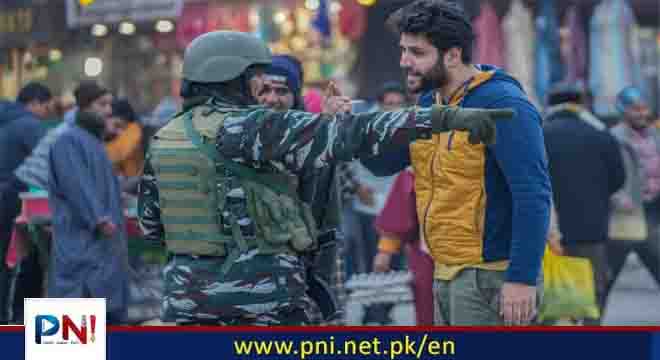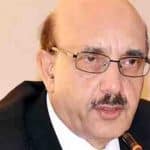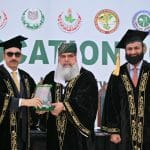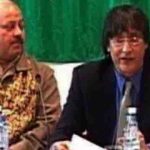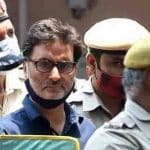Srinagar, JAN 04 (ONLINE): In Indian illegally occupied Jammu and Kashmir, leaders and organizations of the All Parties Hurriyat Conference (APHC) have reiterated their unwavering commitment to the struggle for self-determination and urged the United Nations to play a key role in implementing the historic 5th January 1949 resolution to resolve the Kashmir dispute once and for all.
According to Media reports on January 5, 1949, the United Nations Security Council (UNSC) passed a resolution affirming Kashmiris’ right to determine their future through a UN-sponsored plebiscite. Kashmiris observe this day as the Right to Self-Determination Day.
In a joint statement in Srinagar, APHC leaders Syed Bashir Andrabi, Khawaja Firdous and Junaid-ul-Islam urged the international community to resolve the Kashmir dispute in its true context to ensure peace in South Asia. They emphasized that peace can only be achieved when Kashmiris are granted the right to determine their future. Citing the UN’s 1949 resolution, they noted that the issue remains unresolved due to India’s obstinacy. They highlighted the immense sacrifices made by the Kashmiri people and called for global action to resolve the dispute, warning that without it, peace in the region will remain elusive. The leaders expressed concern over the UN’s silence and the inaction of international powers, which threaten South Asian peace.
Incarcerated APHC leader Bilal Ahmed Siddiqui, in a statement issued in Srinagar, described the 5th January 1949 UN resolution on self-determination as the fundamental framework for resolving the Kashmir dispute. He highlighted that the UN has passed over a dozen resolutions affirming the Kashmiris’ inalienable right to self-determination, with both India and Pakistan as signatories. However, despite nearly eight decades of suffering, the UN has failed to take concrete steps to implement these resolutions, prolonging the political and humanitarian crises affecting Kashmir and South Asia. Siddiqui stressed that for the UN to maintain its credibility, it must take meaningful steps to enforce its resolutions, alleviate the decades of hardship faced by the people of IIOJK, and ensure lasting peace and stability in South Asia.
Hurriyat leader Zamrooda Habib called on the UN Security Council to take immediate notice of the suffering endured by Kashmiris and work towards a peaceful resolution based on UN resolutions and the aspirations of the Kashmiri people. She urged the UN to fulfill its responsibilities to restore its credibility and contribute to peace in the region.
Another APHC leader Dr. Musaib, in a statement in Srinagar, reiterated that Kashmiris have made unparalleled sacrifices in their struggle for self-determination. He emphasized that peace will remain elusive until the Kashmir dispute is resolved in accordance with UN resolutions and the wishes of the Kashmiri people. Dr. Musaib concluded that allowing the people of Jammu and Kashmir to decide their future through a free, fair, and impartial referendum under UN supervision is the only viable path to a peaceful resolution.
On the eve of Right to Self-Determination Day, various parties affiliated with the APHC have issued strong statements reaffirming their commitment to the struggle for Kashmiri people’s struggle for self-determination.
In this regard, Jammu Kashmir Democratic Freedom Party (JKDFP), in a statement in Srinagar, called on the UN to fulfill its legal and moral obligations and help implement the resolution. It emphasized the need for the international community, especially the UN, to act to end human rights violations in IIOJK and resolve the long-standing dispute. DFP condemned India’s state terrorism and demographic changes aimed at converting the Muslim-majority region into a minority.
The Jammu and Kashmir National Front (JKNF) also backed the implementation of the UN resolution as the most viable solution to the dispute. Wani criticized India’s military occupation and deceitful policies, which hinder peaceful resolution efforts. It stressed the urgent need for the UN to intervene and ensure a free, fair, and impartial referendum under its supervision to allow Kashmiris to decide their political future.
The JKDFP and JKNF emphasized that a plebiscite, as envisioned by the UN, remains the only path to resolving the Kashmir issue peacefully.
The Tehreek-e-Wahdat-e-Islami (TWI) in a statement in Srinagar, reaffirmed that Kashmiris will never compromise on their right to self-determination and will continue resisting India until this right is realized. It lamented that, despite over seven decades, this right remains unfulfilled due to India’s stubbornness. The TWI stressed that India’s atrocities have not weakened Kashmiris’ resolve. It also recognized Pakistan’s vital role in representing the Kashmiri people on international platforms, expressing deep gratitude for its political, diplomatic, and moral support.
The Islamic Shuhda-e-Mahaz Kashmir, in a statement from Srinagar, expressed disappointment over the United Nations’ failure to implement its own resolutions and take meaningful steps to pressure India into pursuing a peaceful resolution of the Kashmir dispute. It also criticized the world powers that had supported Kashmiris’ right to self-determination but have not honored their promises. The party emphasized that in their pursuit of this right, Kashmiris have made immense sacrifices, including losing their lives and education, while enduring widespread atrocities. Despite these hardships, it said, Kashmiris continue to observe January 5 each year, hoping to awaken the conscience of the international community.
Meanwhile, APHC-AJK senior leader, Syed Yusuf Naseem Advocate, in a statement in Islamabad, urged the international community to address the 77-year-long Kashmir dispute. He called on the UN to honor its promise to grant Kashmiris their internationally recognized right to self-determination, as outlined in the 1949 resolution. Advocate Naseem condemned India’s ongoing atrocities against Kashmiris, including mass killings, extrajudicial executions, abductions, and the harassment of women under military siege. He denounced the unjust imprisonment of Kashmiri youth, often on baseless charges, and highlighted the threat to their lives in jail, with families and lawyers denied access.
Another APHC-AJK leader, Muhammad Sultan Butt, stated that Kashmir is the world’s longest unresolved dispute and a critical test for the UN. He stressed that to restore its credibility, the UN must take immediate and decisive action to implement its resolutions on Kashmir. Butt pointed out that the UN’s failure to act has allowed India to solidify its illegal occupation through brute force. He emphasized that self-determination is a fundamental human right, yet Kashmiris have been denied this and many other basic rights, putting their very existenCE at risk.
Follow the PNI Facebook page for the latest news and updates.


